2.15 הֵא
היְדִיעָה -
ה
THE DEFINITE ARTICLE "THE"
In Hebrew when you want to talk about something like "the
dog" or "the
city"
the letter
ה
תיק חסֵר! The purse is missingה
סֵפֶר חדש. The book is new
Now let's add an adjective that is describing the purse, making it a black purse. So what purse is missing?
The black purse is missing! התיק השחור חסֵר!Notice that the adjective "black" also has the definite article
ה at the beginning of the word. Remember,NOTE: THE ה IS ALWAYS ATTACHED TO THE WORD - it is never separate and by itself.
If the noun is definite, the adjective must also be definite and refer to something specific.
ה
If the noun and adjective are about parents in general you
Think about whether the
phrases below are specific or general.

Say the Hebrew for each
phrase:
![]()
100.00 %
a big book __________________________________________
the big book
a good student
the tall man
the tall student
the good student
a new student
the new student
the tall (f) student

יואב: מי זה שם? נעמה: זה המורה החדש
למתימטיקה. יואב: הוּא מורֶה טוב? נעמה: אני לא יודעת. 101
2.15.1 Using what you have learned about the prefix
The Hebrew words already provided are to help
you with your spelling. Remember:
1) Hebrew word order is not always
the same as in English. Don't do direct word by word translations! 1. The student is good in math
2. The good student went to class.
(
תלמיד )
__________________________________________________________________________ 3. The good books are in the library
__________________________________________________________________________ 4. There is
_________________________________________________ 5. That is
(
_________________________________________________________________________ 6. The nice songs are not long.
(
שירים, יפים, ארוּכּים )
______________________________________________________________________ 7. The teacher (m) is tall.
(
מורֶה, גבוה
) ______________________________________________________________________ 8. The tall teacher is in the cafeteria.
(
מורֶה ) ________________________________________________ 9. The long letter is in the purse.
(
מיכְתב, ארוך
) ________________________________________________________________________ המורה: בוקֶר טוב. יואב,
לֵךְ אֶל הלוּחַ בְבקשה. יואב: מה לכְתוב? המורה: בְבקשה לכְתוב את
השעה. (יואב כתב חמֵש) המורה: יואב, עכְשיו השעה
לא חמֵש. השעה אחת יואב: או, סליחה, המורה
102
2.16
שֶל
-EXPRESSING OWNERSHIP IN HEBREW 'my-mine' A purse that was left on a bus seat could simply be a
lost item, left behind because the person got off the bus in haste or
because the owner was carrying so many packages that she simply didn't
notice it was missing. However, it could also be a suspicious item! Or . . .
it could simply be the purse of a woman who had moved to another seat on
the bus to talk to a friend.
Imagine that someone has just informed the driver about the unattended
bag. He promptly stops the bus and addresses the passengers, with a word
used to address adults formally:
100.00 %
רבותַיי ! שֶל מי התיק? רבּותַיי ! רבּותַיי! שֶל
מי Then a woman interrupts her conversation with her friend ... "או, סְליחה, זה
The driver wants to be
certain ... "זה She assures him: "כֵּן, כֵּן! זה
103 Now that we have solved the mystery of the missing
purse-owner, let's review the conversation. (Fill in the blanks as you
think it through.) He asked What did he want to know? (answer in English)
___________________________________________ Now write in Hebrew what he asked.
____________________________________________________ She responded: Write what she said in Hebrew: _________________________________________________________ Then he demanded: "Is that your purse?" Express that in Hebrew: _______________________________________________________________ 1. What is the Hebrew word for 'purse'?
_________________________ 2. How did she express in Hebrew: "That's my purse."?
____________________________________
2.16.1
שֶל: הצוּרות ביחיד
- שֶל
The Singular forms of
100.00 %
IMPORTANT: The and הַ הַ הַ הַ הַ Fill in the blanks in Hebrew. Listen to the audio to see
if you did it correctly.
my aunt
________________ his aunt (m)
________________ your aunt (m)
________________ her (f) aunt ________________ your (f) aunt
________________
100.00 %
Note: While not needed for this exercise, the
plural forms of
104 Write the Hebrew translation for these sentences in the
blanks .
Don't omit the definite article before the noun! הַ
your (f) parents
________________________ his parents
________________________ her parents
________________________ my book
________________________ your notebook
________________________ my teacher
________________________ your book is big
________________________ your (m) notebook
________________________ your (m) purse
________________________
2.16.2 You may find some new items in these sentences. Don't
let that worry you. See if, working as a group, you can use context
to figure out the meanings and even learn some new facts about Hebrew
constructions. Be sure to use all your Hebrew phrases in your comments
to one another.
100.00 %
תרְגֵם איפֹה ההורים שֶלְךָ?
הֵם בְתֵל־אביב. כתבְתי מיכְתב ארוך
לַדוד שֶלי. רינה, את אמרְת שֶהבַּיִת
שֶלָך קטן. לֹא נכון! הבַּיִת שֶלָך גדול! הסטוּדֶנְט החדש לא גר
עִם ההורים שֶלו. רחל, כבר למדְתְ לקרוא
עברית... מי המורה שֶלך?
105 לתרְגֵם Can you guess the
"meaning" of the plural forms of
1 לֹא, הבַיִת שֶלנוּ שם. אבא ואִמא רינה ודפנה
2.17
שירים
- SONGS 2.17.1 אני ואתה
נְשַנֶה אֶת הָעולָם
Preparation for learning the song. Read the
vocabulary below and look for the words and phrases in the song. Can you
guess the meaning of the lines in the song? Words and Phrases to Note:
it will be
יִהְיֶה
the world
העולם You
and I
אני ואתה
they've said it before
אמְרוּ את זֶה קודֶם
before me
לְפניי
It doesn't matter / I don't care
זֶה לֹא מְשנֶה terrible
נורא
bad
רע 106
100.00 %
(הַבַּיִת הָרִאשון) אֲנִי וְאַתָּה
נְשַנֶה אֶת הָעולָם
אֲנִי וְאַתָּה-- אָז יָבואו כְּבָר כּוּלָם אָמְרוּ אֶת זֶה קודֶם
לְפָנַי—
לֹא מְשַנֶה אֲנִי וְאַתָּה נְשַנֶה
אֶת הָעולָם!
(הַבַּיִת הַשֵנִי) אֲנִי וְאַתָּה נְנַסֶה מֵהַתְחָלָה יִהְיֶה לָנוּ רַע-
אֵין דָבָר, זֶה לֹא
נורָא אָמְרוּ אֶת זֶה קודֶם,
לְפָנַיי
לֹא מְשַנֶה אֲנִי וְאַתָּה נְשַנֶה
אֶת הָעולָם!
1. What is this song about? 2. Which words express the couple's nonchalance
about difficulties? 107
![]()
2) If the noun is "definite" ( specific") it needs the
ה
and the adjective does too.
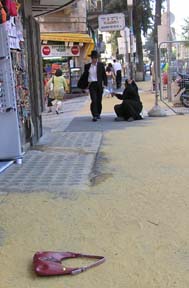
![]() Use with Software Chapter 2:10 "Expressing Possession with שֶל
Use with Software Chapter 2:10 "Expressing Possession with שֶל![]()
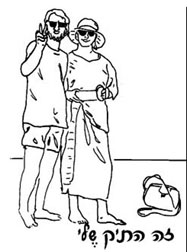
![]()
![]()
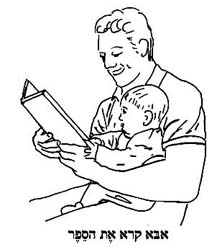 your (m) parents
________________________
your (m) parents
________________________


![]()
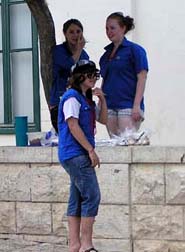
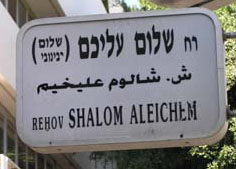

![]() Use with Software Chapter 2 Drill 3
"Learning A Song"
Use with Software Chapter 2 Drill 3
"Learning A Song"

אני
ואתה נְשַנֶה אֶת הָעולָם
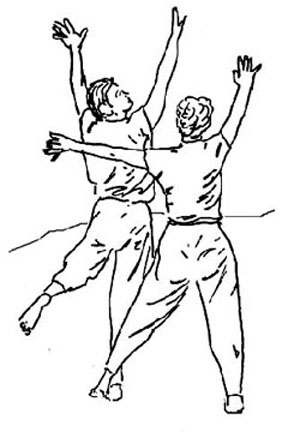
![]()
הֶעָרָה
So, how do you say 'a' dog?
Usually you don't use any word.
Example: A dog named Domino.
כֶלֶב בְּשֵם דומינו
However, there are times when Hebrew uses the number 'one' in masculine or feminine— (to match the gender of the word).
for example:
A dog named Domino.
כֶלֶב אֶחד בְּשֵם דומינו
Or, for a female dog:
A dog named Sisi.
כּלְבּה אחת בְּשֵם סיסי
But remember, if you do use the number 'one' for 'a' you should not emphasis the word אֶחד or אחת in your sentence.